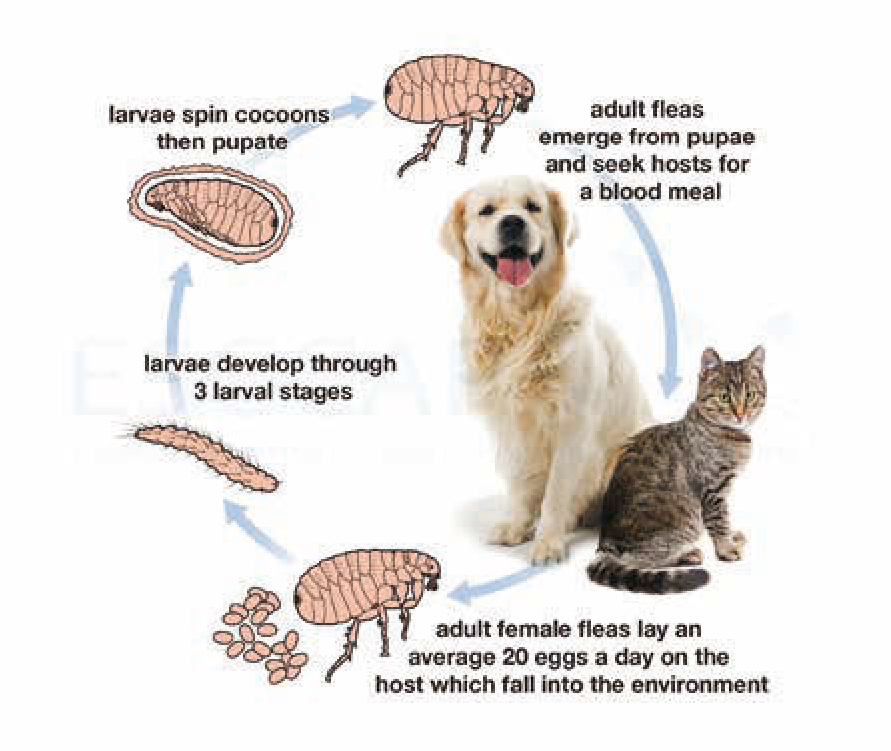Many pet owners believe fleas to be a seasonal problem and, although they may treat their pets for fleas during the warmer months, they may stop preventative treatment over the winter. This is the perfect opportunity for fleas to inhabit a host and infest the home, which can result in ongoing and unresolved flea problems for both the pet and owner.
Fleas will happily live outside during the warmer months, but are equally happy to live indoors in carpets and soft furnishings. We often see a boom in flea numbers in the spring — with the arrival of warmer weather, and in the autumn — when we first turn our heating on in the home. Only 5% of a flea infestation is represented by adult fleas on the pet, the remaining 95% exists in the environment as immature stages (eggs, larvae and pupae). Therefore, treatment of the pet is only part of an effective control strategy and treatment of the environment, such as bedding and carpets, is essential to eliminate infestations.
A female flea can lay up to 50 eggs per day in the coat of the host. Many of these eggs then fall off the host into the environment. Hot spots for high numbers of flea eggs are in areas where the pet regularly frequents, for example in pet bedding and other areas where they may sleep. Washing of pet's bedding and regular vacuuming of the home, especially carpets, below curtains, under furniture edges and in and around areas where pets sleep, is especially important in controlling flea infestations — it is estimated that vacuuming alone reduces the number of flea eggs in the environment by 50%.

In the right conditions in a home, flea eggs will hatch into larvae in as little as 2–5 days. These then burrow down into dark spaces such as cracks in the floorboards and deep into carpets and mature into adult fleas in cocoons knows as pupae. Pupae are very resistant to insecticidal treatments and are likely to still hatch even after treatment of the environment. When adult fleas hatch from their pupae they will immediately begin searching for a blood meal. Female fleas can then start producing eggs 24 hours after their first blood meal.
The entire lifecycle of fleas can take a little as 12 days to complete if conditions are right, or fleas can lie dormant as immature stages for nearly a year waiting for the right time to develop and continue reproducing. Elimination of flea infestations must take into account the need to break the lifecycle of fleas and this can take time and more than one treatment attempt.
Effective flea control is three fold:
- Treat all pets in the home, ideally with an effective adulticide to prevent further egg laying. It is important to remember that live fleas may still be seen on the pet hours or days after treatment depending on the product used.
- Treat the environment with an insecticide and also by washing pet bedding, cleaning and vacuuming areas where the pet resides.
- Compliance and expectation — flea infestations can take months to eliminate. Remember, a persistent flea infestation is not in itself an indication of resistance. Elimination of a flea infestation takes time and compliance by the pet owner.
Many of us are still awaiting the winter ‘cold snap’ which will prompt us to crank up the heating in our homes. But remember, it is not only us that is currently benefitting from the above average winter temperatures. Remain vigilant for fleas and flea infestations, and encourage your client's to do so as well, otherwise we may find ourselves feeding more than just our family this Christmas…


